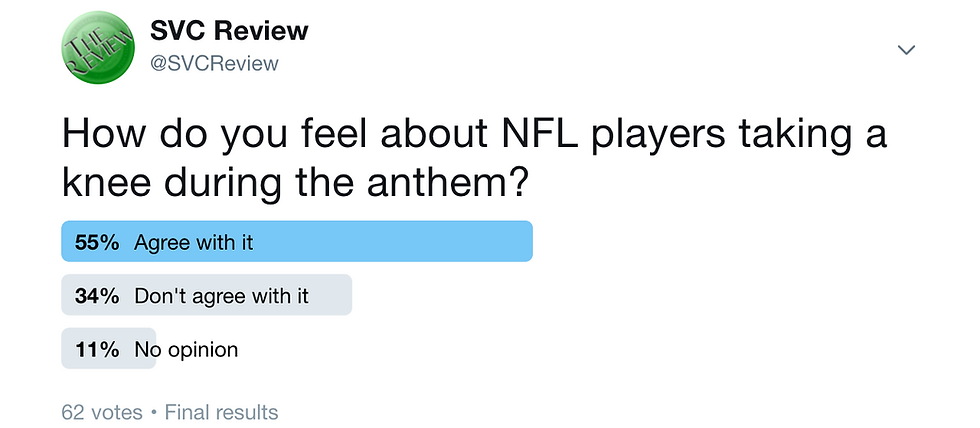SVC faculty, students respond to NFL anthem protest debate
- Oct 12, 2017
- 3 min read

In 2016, a number of NFL players, following the lead of San Francisco 49rs quarterback, Colin Kaepernick, chose to kneel or sit during the national anthem. The beginning of the 2017 NFL season has brought the controversy back into discussion.
“I am not going to stand up to show pride in a flag for a country that oppresses black people and people of color,” Kaepernick told NFL Media in an interview after a game against Green Bay at Levi’s Stadium in August of 2016.
Protests continued sporadically into the first weeks of the 2017 season. On Sept. 24, players from nearly every team participated in the protests, following remarks made by President Donald Trump at a rally for Luther Strange, candidate for the Senate, in Alabama.
According to Time Magazine, the president stated: “Wouldn’t you love to see one of these NFL owners, when somebody disrespects our flag, to say, “Get that son of a bitch off the field right now. Out. He’s fired. He’s fired!”
Trump followed up with a tweet, voicing the same opinion and suggesting that protests have led to declining TV ratings for the NFL.
A recent CNN poll found that Americans are evenly divided on the issue, with about 43% supporting player protests and 49% opposed.
The Saint Vincent College Democrats club provided a statement supporting the protests.
“Very few, if any, of the protesters have protested as an attempt to disrespect those who have served. Service men and women deserve the utmost respect. One unique thing about the United States is our commitment to protecting freedom of speech, and our armed forces and veterans have fought to assure that right. Kneeling during the national anthem is a form of peaceful protest, and these types of protests are pivotal to American free speech. It is the constitutional right of every American citizen to decide for themselves how they express their views,” the statement read.
But Dr. Jason Jividen, associate professor of political science, doesn’t think
free speech is under threat.
“I don’t think it’s really so much a free speech issue as what it’s been presented as, in the legal sense. With Trump’s tweets, there would have to be some notion of government coercion, and some way of intimidating or chilling that speech. Otherwise the relationship with speech is purely contractual, with the NFL and with the owners and with the team,” Jividen said.
William Culver, president of the College Republicans, provided a statement on behalf of the club questioning whether the anthem is the most effective and respectful time for a protest.
“It seems that the movement calls for unity of Americans on a particular issue by protesting during a moment that has historically represented American unity. I do not believe that this action necessarily is mutually exclusive of the exercise of speech, in that there are various constitutionally protected gestures that can be taken to be disrespectful toward the flag or our nation which it represents, e.g., flag burning. I also, therefore, reject the idea that someone protesting the flag is representing what it “truly” stands for, under similar persuasion as employed for the argument on the grounds of the NFL’s call for unitary protest during the national anthem--a somewhat paradoxical and irreverent gesture toward that very symbol of unity,” Culver said.
Dr. Thaddeus Coreno, associate professor of sociology and anthropology, focuses his teaching and research on issues of inequality. Coreno states that the controversy about whether players are disrespecting the flag is actually a distraction from the real issues.
“What we’ve been talking about now, for seven days, is the flag,” Coreno said, “and we’re not talking about what, in my opinion, is inequality, racial segregation, ghettoization, poverty, and the connections those have with violence and crime and despair.”

Photo: Jonathan Meilaender







Comments